.png)
13 Best WordPress Alternatives in 2025 (Top Picks)
Sep 8, 2025
WordPress has powered the internet for two decades, but let’s be honest, it’s not always the right fit anymore. Plugins break, updates pile up, and sometimes all you want is a simpler (or smarter) way to get your website live.
The good news? 2025 is full of fresh options. From drag-and-drop builders that feel effortless, to ecommerce platforms designed to scale, to AI tools that spin up full websites from a single prompt, there are more choices than ever before.
In this guide, we’ll break down the 13 best WordPress alternatives for 2025. Each one solves a different need: whether you’re running a store, showcasing your portfolio, or just tired of wrestling with plugins.
If you’ve ever wondered, “Is there something easier, faster, or just better than WordPress?”, this list is where you’ll find your answer.
0. Comarketer.dev
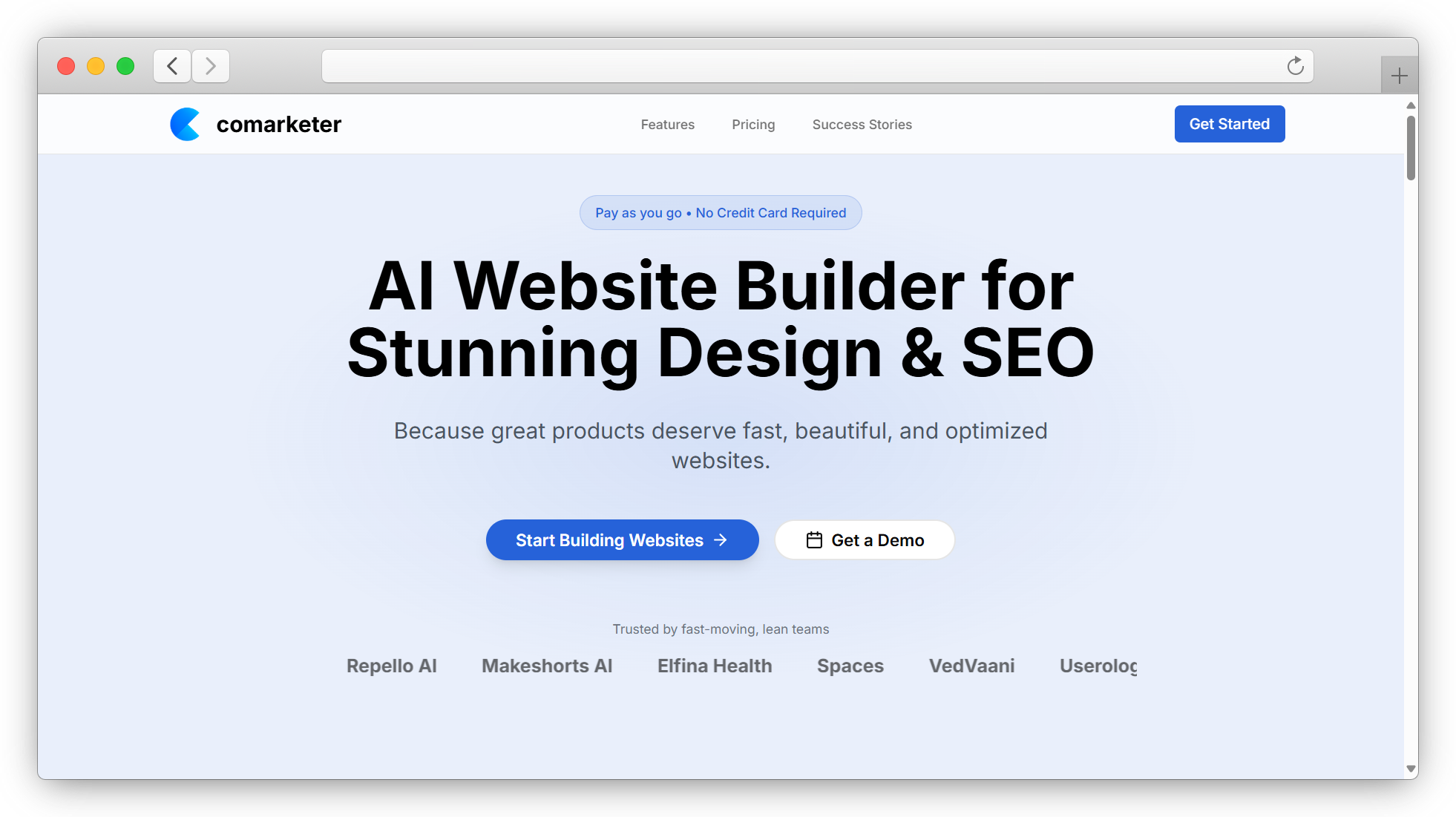
Comarketer.dev lets you describe your website in plain English and builds it instantly. The platform automatically handles SEO optimization, mobile responsiveness, and performance, all the technical stuff that usually requires multiple WordPress plugins and hours of tweaking.
Recent user feedback highlights its chat-based editing system, where you can literally tell the AI "add a testimonials section below projects" and watch it happen in real-time. Plus, the built-in Vercel deployment means no dealing with WordPress hosting headaches or security updates.
Where it shines
- Chat interface feels like having a web designer on demand
- Generates SEO-optimized sites automatically (sitemap, robots.txt, meta tags)
- Visual editor + code access gives you flexibility without complexity
- One-click deployment with free custom domain hosting
- No plugins, themes, or security updates to manage
- Payload CMS integration for dynamic content without WordPress bloat
Best if you're…
A founder, agency, or business owner who needs professional websites fast without WordPress maintenance overhead.
Perfect for portfolios, business sites, and landing pages where you want AI speed but still need the ability to customize code when needed. It's the WordPress alternative for people who want results, not complexity.
1. Wix, Most Popular Drag-and-Drop Builder

If you’ve ever thought, "I just want a real website, fast, simple, and pretty," Wix might just be your shortcut to doing that without the raft of plugins and server headaches that WordPress drags along.
It’s one of the best WordPress alternatives that gets mentioned first for good reason.
Why it’s such a popular pick in 2025
Website Builder Expert crowned it the top builder in 2025, calling out its drag‑and‑drop editor, AI tools, free templates, and built‑in support as major wins.
TechRadar’s recent pricing coverage also highlights Wix’s broad plans, from a free tier up to Business Elite at $159/month, plus options like AI‑driven design, collaboration via Wix Studio, and developer tools through Velo. Even the Wix AI Website Builder, which launched in early 2024, is praised for generating a ready‑made site from just a few simple answers, then letting you tweak as you like.
Where it shines
- Super friendly editor, perfect if you’re starting from zero.
- Tons of stylish templates that work right out of the box
- AI tools for quick setups and content suggestions
- Hosting, security, SEO tools, all included
But it isn’t flawless.
- Longer‑term customization? It can feel limiting compared to WordPress or Webflo.w
- Free plan has Wix branding and limited bandwidth storage.ge
- Premium plans can get pricey, especially when you tack on domains, analytics, or pro features.s
Best if you’re…
Launching a personal blog, freelance site, or small business page, and want a polished result with minimal fuss. Almost everything's built in, so you don’t get bogged down with plugins, hosting, or updates, which makes it a really friendly WordPress alternative.
2. Webflow, Visual Development for Designers & Marketers

Now, if you geek out over design and precision but still want a no‑code tool, Webflow is one of those platforms that feels like a missing link between pure creativity and clean, robust code.
In 2025, it's evolved into a full “Website Experience Platform” with AI, analytics, CMS power, and even full‑stack deploy options.
What’s new and why people love it
By mid‑2025, Webflow added AI helpers for generating page sections, experimenting with layouts, and even building sites from simple text prompts. Its CMS now supports nesting, live previews, auto‑save, localization, and even an analytics suite built right into the platform. Teams can also build reusable design systems, preview custom code, and deploy full‑stack apps through Webflow Cloud, no extra servers needed.
What stands out
- Total design control without writing code (but clean code is still generated for you)
- Enterprise‑level hosting, fast performance, and solid SEO features baked in.
- Everything’s nativ e, no plugins, less maintenance pain
- Excellent for scaled content workflows and campaign sites, especially for SaaS or marketing teams
But it can feel…
- Steeper to learn, especially if you’re used to WYSIWYG simplicity
- Pricing isn’t cheap, especially once you need CMS or team collaboration features.
- It still lacks plugin depth compared to WordPress, so things like LMS or booking systems need external tools too.ls.
Best if you’re…
A designer, marketer, or agency that wants complete control, clean code, and freedom to scale, without managing WordPress extensions. If you want a tool that grows with your brand and feels tight and modern instead of plugin-janky, Webflow is a smart bet.
3. Weebly, Super Simple, Especially for Small Stores
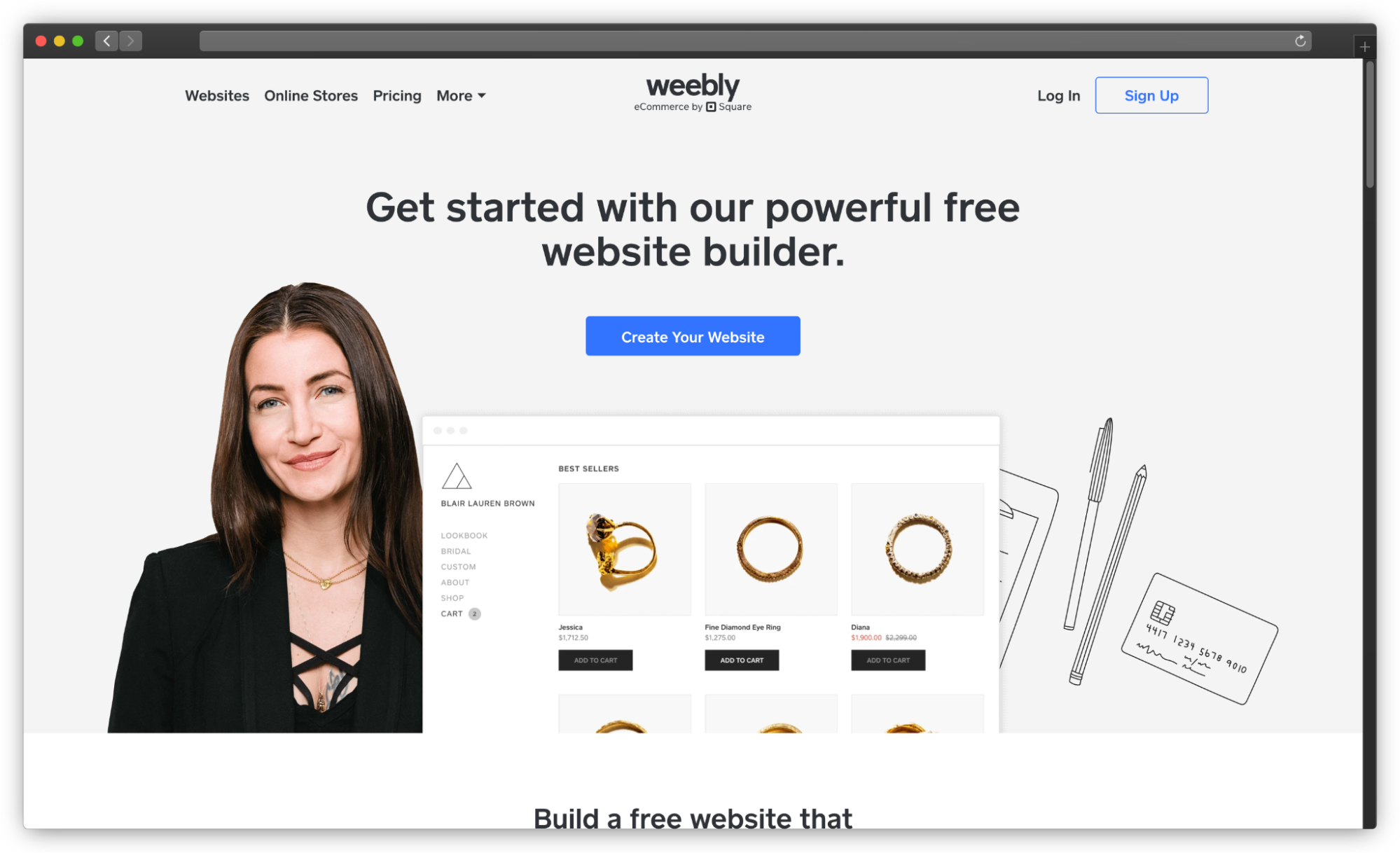
If you're after something that feels effortless, Weebly still earns props for being one of the easiest builders around. It's drag-and-drop to the max, great for folks who want no friction. Especially nice? Anyone using Square/Block for payments can get their store up fast. Weebly is integrated behind the scenes.
Why people like it in 2025
- One-click setup and hosting feel really beginner-friendly
- Built-in store features work right out of the box, with simple e-commerce tools
- Solid value compared to SaaS overload, but customization is simpler and more limited
What you lose compared to WordPress
- Less flexibility, limited apps, or design depth
- Features aren’t expanding much, so some even worry Weebly might wind down.
Best if you’re… A beginner just wanting a quick, basic site or a small online store, especially if you already use Square. It’s simple, fast, and painless, but maybe not ready for a major scale.
4. Squarespace, Design-First, All-In-One Powerhouse

If looks and polish matter most, and you still want simplicity, Squarespace has stayed in the spotlight for good reason. In 2025, it’s still a go-to for gorgeous templates, beginner-friendly tools, and solid built-in features (blogging, scheduling, commerce).
Why it’s worth talking about
- Templates feel like they’re museum-level beautiful, and they’re mobile-friendly, too.
- Offers things like built-in booking, premium design blocks, blogging, and analytics, depends on your plan
- Packs everything in: hosting, domain, SEO tools, and commerce options from the launch
Where it isn’t perfect
- No free plan means you’ll have to commit before seeing the payoff.
- The grid-based editor is polished but a bit more rigid than something like Wix
- Some users notice slower page loading or less SEO depth, depending on how you use it.
Best if you’re…
A creative thinker or small business owner who cares about image, branding, and ease. Squarespace makes beauty feel simple. If WordPress ever felt clunky and plugin-y, this is the refined, easier-to-care-for version.
5. Hostinger Website Builder, Budget Pick With Smart AI Extras

Want something cheap that still feels modern? Hostinger is showing up everywhere in 2025, and for good reason; its drag-and-drop builder, AI tools, and unbeatable price make it a strong contender.
What stands out right now
- Plans start around $2.99/month, yet include hosting, SSL, and a free domain.
- AI tools for writing content, generating images, analyzing user behavior (heatmaps), and more
- Simple editor, modern templates, plus extras like logo maker and analytics, solid for starters
Where you might hit limits
- No free plan, and once you pick a template, switching means starting fresh
- Features like e-commerce or blogging are still basic; not ready for complex needs yet
Best if you’re…
On a tight budget, eager to launch fast, and love AI to jumpstart your site. If WordPress feels like overkill or overpriced, Hostinger feels surprisingly smart and won’t break the bank.
5. GoDaddy Website Builder, Speedy, No-Frills Launch
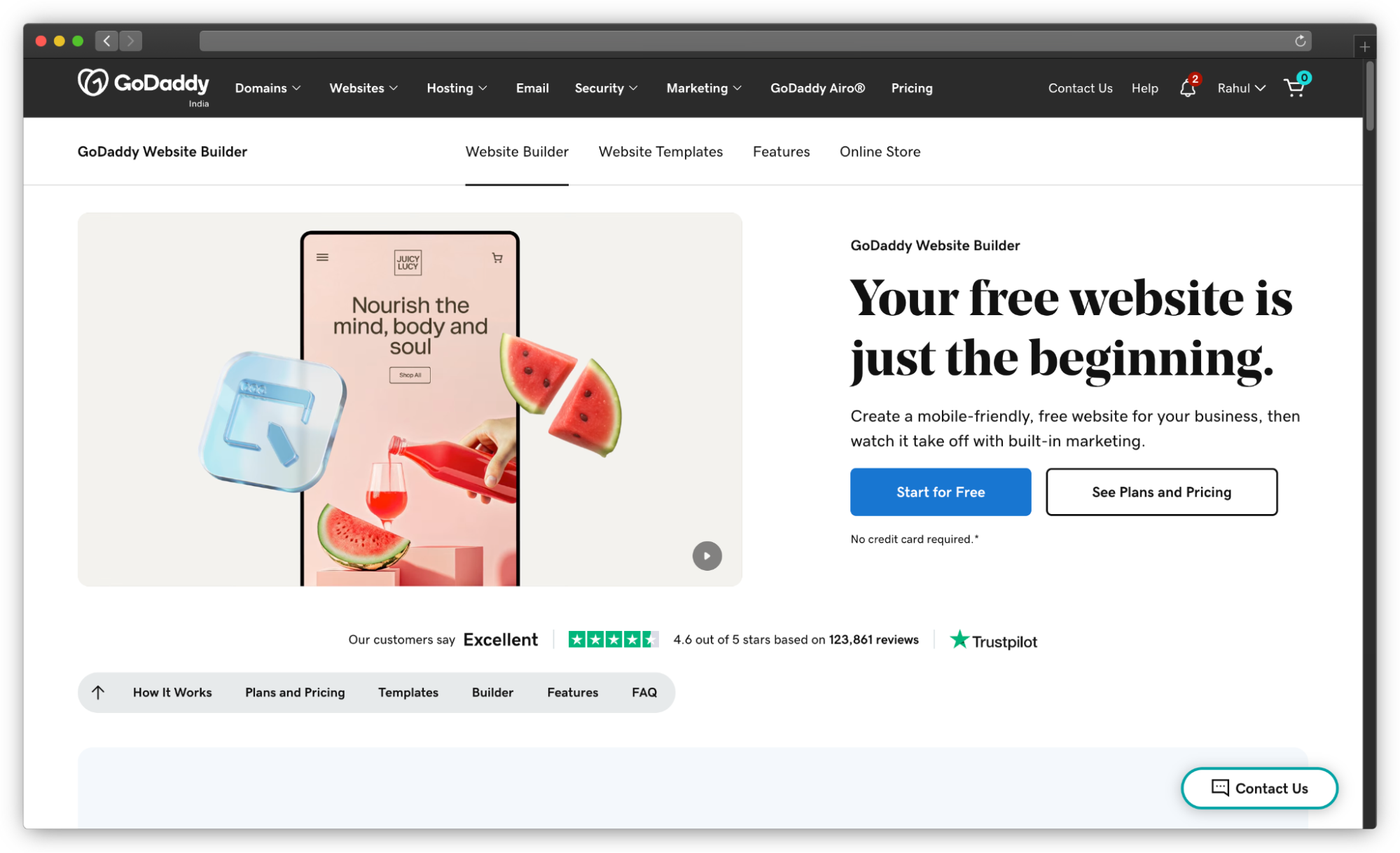
Need a site live yesterday? GoDaddy’s builder is built for speed. It’s aimed at people who want something up fast, with a few marketing bells built in. Tech guides keep naming it as the friendliest for absolute beginners.
Why it’s appealing
- Super fast setup, AI-assisted templates give you a starting point in minutes.
- Comes with basic marketing tools in one package if you’re promoting a local business or small service
Where it won’t win awards
- Simplicity is both its strength and weakness, with less room to customize or scale.
Best if you’re…
Trying to get a site online fast, maybe for something temporary or a quick local offer. It’s not meant to evolve into a powerhouse, but it gets the job done with the least fuss.
6. SITE123, Ultra-Simple, No Thinking Required

If even “simple” feels too much, SITE123 is about as no-nonsense as it gets. The name says it all: just follow the steps, trust the system, and you’ll end up with a decent site.
Why it might click for someone
- Very basic drag-and-drop, free templates, and chat support make everything feel guided.
- No design headaches, just fill in content, pick styles, and you’re live.
What holds it back
- It’s basic. If you’ve used something like Wix or Squarespace, you’ll notice the lack of polish or advanced tools.
Best if you’re… Absolutely new to site building, and want something that practically builds itself. If WordPress looks scary and even other builders feel too much, SITE123 keeps it as minimal as possible.
7. Shopify, The Ecommerce Powerhouse That Keeps Getting Smarter

If you want a platform that grows as fast as your ambitions, Shopify is still the industry favorite, and for good reason. In 2025, it's packed with features that make scaling feel less scary and more exciting.
What’s exciting right now
Over 150 upgrades in the “Summer ’25 Edition” alone, like checkout blocks, bundle support, and AI helpers (Sidekick), mean Shopify is all about making store operations smoother and smarter. They've also launched a clever AI-powered tariff tool and expanded duties collection so you can sell across borders without sweating customs surprises..
Why it stands out
- Built to scale, from single sellers to global brands
- Intelligent AI features that handle repetitive tasks like discounts and descriptions.
- Massive app ecosystem, and clean, dev-friendly tools like Hydrogen for headless storefronts.
Where it might feel too much
- Price can climb fast once you add AI, fulfillment, and app fees
- Some newcomers still find the learning curve steeper than drag-and-drop builders
Best if you’re…
Dreaming big. Starting small but want room to expand into marketplaces, POS, global logistics, or custom experiences. Shopify is one of the best WordPress alternatives if you want the power without setting up plugins and servers.
8. BigCommerce, Built for Speed, Scale, and Serious Sellers

For businesses that know where they’re headed, BigCommerce brings enterprise-level tools without needing an engineering team.
What’s new and noteworthy
Fresh 2025 reviews highlight its deep commerce features, multi-storefronts, headless commerce, advanced B2B tools, and omnichannel selling, ready to go.
They’ve also been pushing sustainability, like green hosting and carbon offset features, so brands with purpose don’t have to patch them in later.
Why it's compelling
- One dashboard, multiple stores, multiple channels, all synced up
- Great reporting, built-in SEO, and solid, secure infrastructure
- Ready for serious brands: international, B2B, or multi-brand setups
Where it might lose some shoppers
- Fewer templates or flashy visuals out of the box compared to Wix or Squarespace.
- Pricing is higher, but worth it if you need the backend complexity it handles
Best if you’re…
A growing brand that needs depth today, not tomorrow. If WordPress ever felt chaotic as you scaled, BigCommerce is the organized step up.
9. Squareup, Free, Friendly, and Brick-and-Mortar Ready
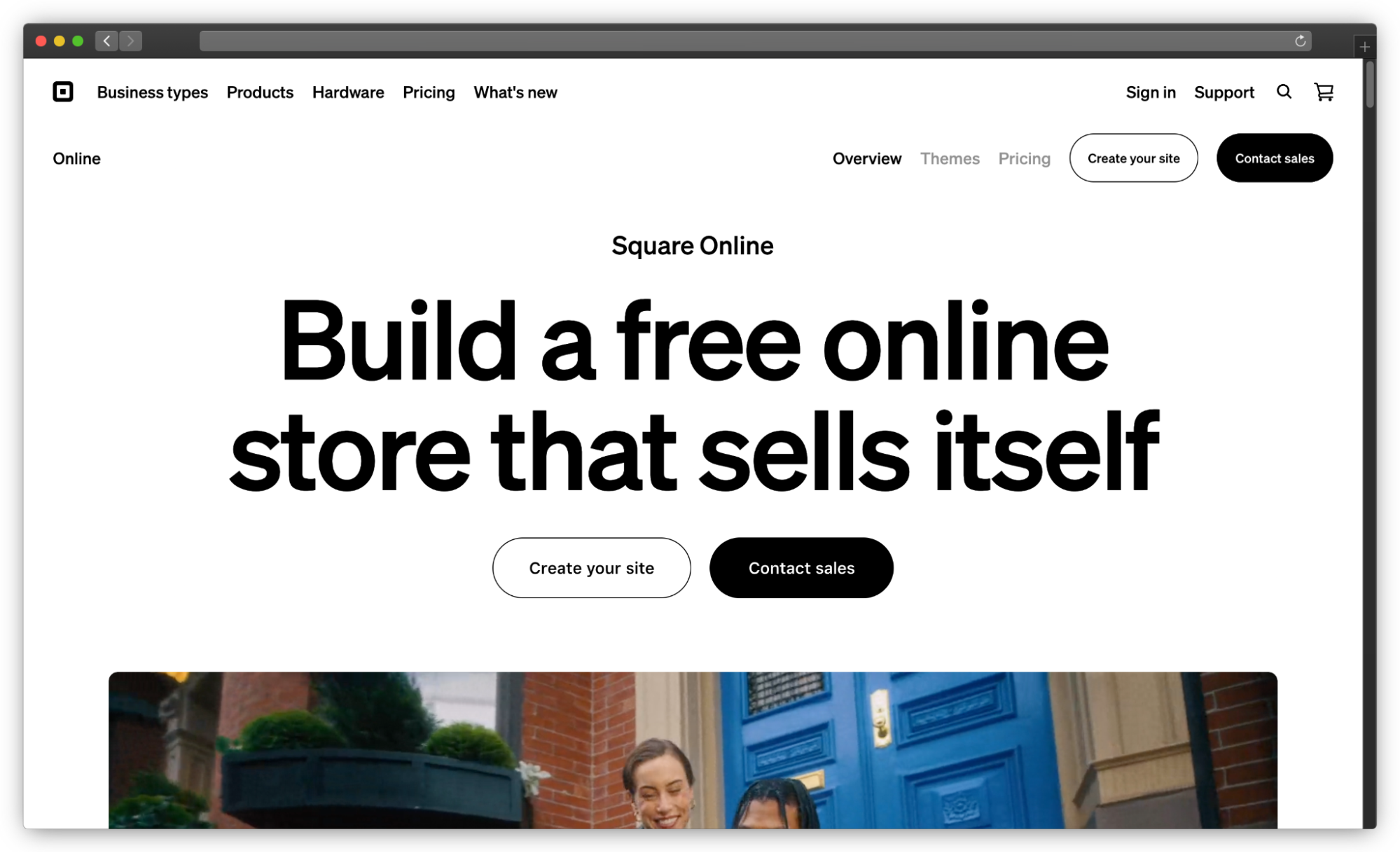
Need an e-commerce platform that works just as smoothly for your shop as it does online? Square Online makes that happen, with zero monthly cost to start.
Why it’s catching eyes in 2025 Square Online offers a totally free tier, pay only per sale, and syncs cleanly with Square POS for easy in-grain inventory and order management.
It also packs built-in social integrations, SEO, and marketing tools, so you can launch fast and grow steadily.
Where it shines
- Free plan gets you up and selling fast, ideal for startups and local sellers
- Unified inventory across online and in-store channels
- No hosting headaches, easy customization, and marketing tools included
Where it doesn’t shine bright
- Features are basic,good for everyday needs, not complex setups
- Free plan has transaction fees of 2.9% + 30¢, so scaling might mean costs stack up.
Best if you’re…
Running a local shop or small brand and want to test going digital without upfront fees. It’s a refreshingly simple WordPress alternative when you don’t need a plugin jungle.
AI Website Builders (4)
10. Divi AI, Your Design-First WordPress Sidekick

Think of Divi AI as your all-in-one helper, designer, copywriter, coder, and artist all rolled into one. Built right into the Divi Builder, it leans on the Divi 5 theme, so it knows your site and its design language inside and out.
What makes it feel special
- Generate full page layouts, text, and images with a simple prompt, then tweak visually.
- Need a specific tweak? Divi AI can write custom CSS or code tailored to Divi’s modules.
- It respects your brand, learning your fonts and colors so everything it creates stays in style.
- Speeds up building: prompts turn into “quick sites,” complete with layouts, images, and written copy.
Where it might not be your go-to
- It’s part of Divi and WordPress; if you’re not already in that ecosystem, it won’t work.
- There’s a cost; Divi AI is an add-on, priced at about $16/month (or $193/year) on top of an Elegant Themes membership.
Best if you’re…
A WordPress user who wants to save time but keep design tight and on-brand. If you build landing pages, websites, or write often, this is the kind of AI buddy that keeps ideas flowing and workflows fast.
11. 10Web, AI Meets WordPress Made Easy

10Web is all about bringing AI power to WordPress, smoothly and smartly.
What stands out today
- Paste a URL and AI recreates the design as a WordPress site, with a high PageSpeed score baked in.
- Their new plugin brings AI creation right inside WordPress, chat your vision, and it builds your site, WooCommerce-ready too.
- Users get AI tools, hosting on Google Cloud, a drag-and-drop editor, and an AI Co-Pilot, all in one platform.
Where it could feel limited
- Tied purely to WordPress, if you're on Wix, Squarespace, or Webflow, this won’t fit.
- AI does great first drafts, but you usually need to polish manually to stand out.
Best if you’re… Working with clients and want to impress by turning their old site into a fast, clean WordPress version in minutes. Also ideal for agencies or hosting providers looking to offer AI-powered site creation as an upsell.
12. Jimdo, AI That Keeps It Simple and Sustainable
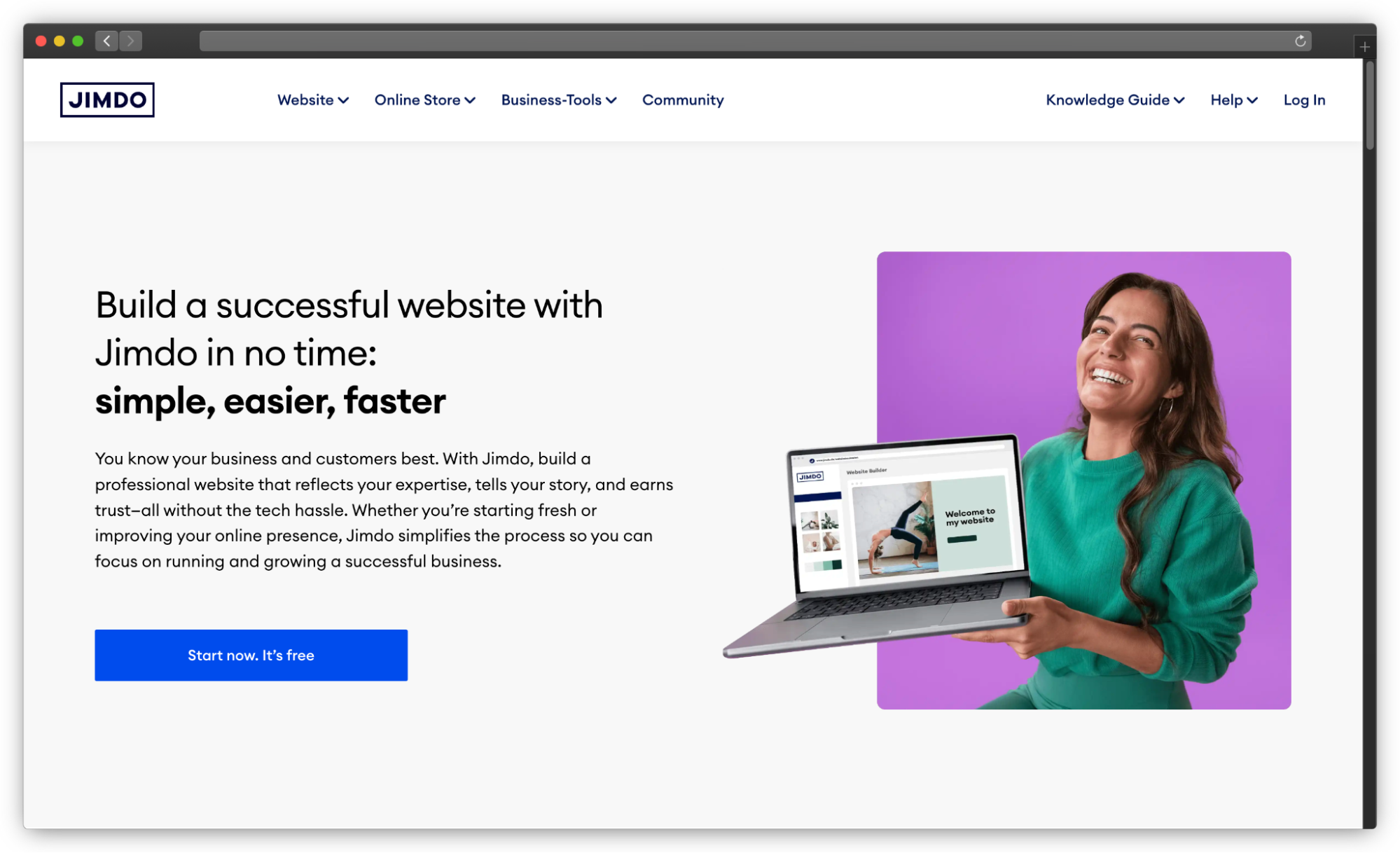
Jimdo’s Dolphin AI makes building a site feel smooth, simple, and even eco-conscious.
What’s cool about it
- Answer a few questions, and Dolphin AI generates a full site for you. Easy editor to tweak visuals and layouts afterward.
- Offers a free plan (with branding) and paid plans from around $9–11/month, including custom domains.
- Green-supportive: features like design recycling, eco-hosting, and carbon footprint tracking appeal to eco-conscious brands.
Where it might fall short
- Limited customization and fewer templates compared to bigger platforms. Not great for large or complex projects.
Best if you’re…
A creative or small business focused on simplicity, sustainability, and quick setup. If WordPress feels heavy and you care about your environmental footprint, Jimdo’s Dolphin AI is a friendly, smart pick.
13. Relume, AI That Helps Designers Go From Idea to Wireframe Fast
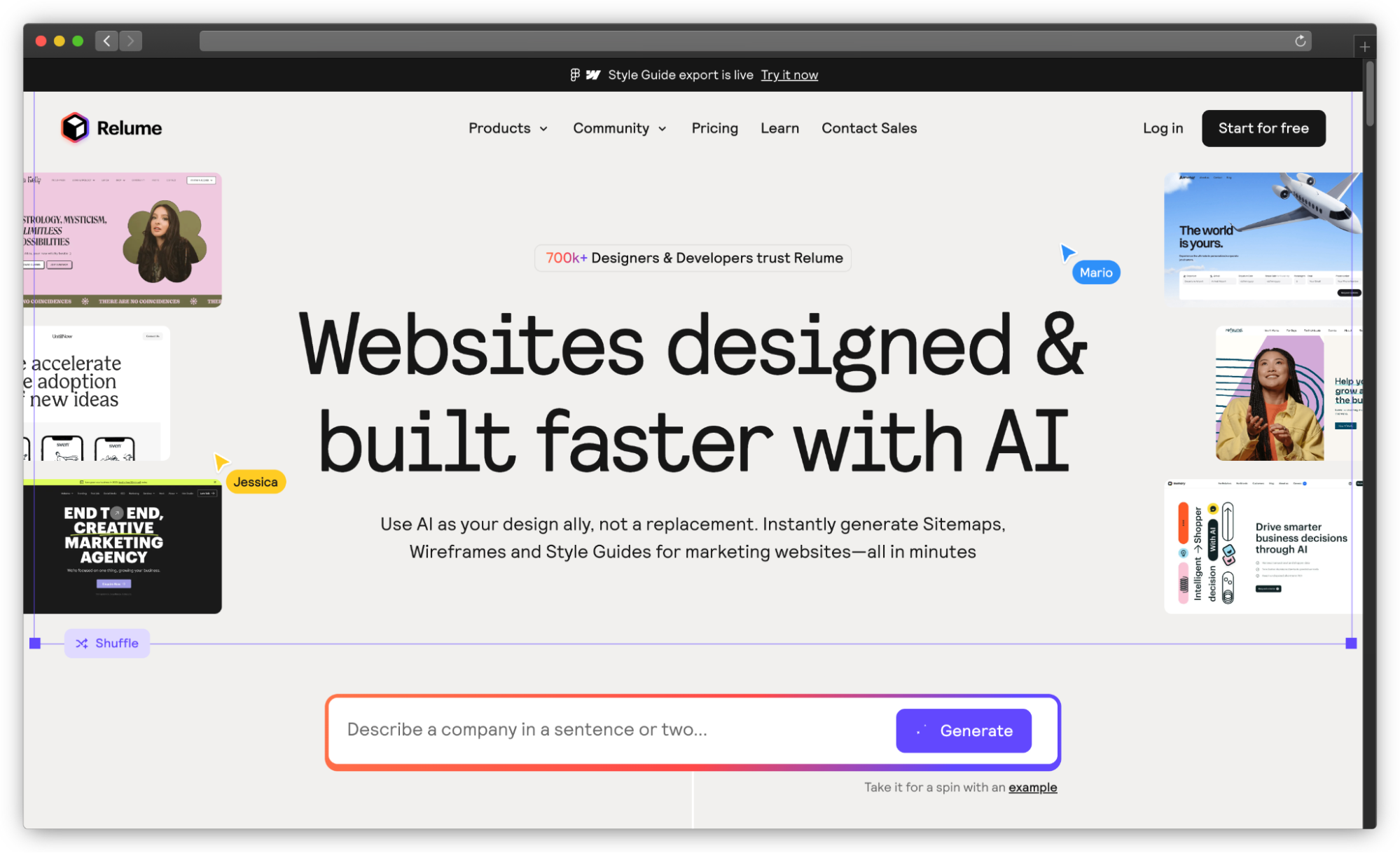
Relume is for designers, not builders. It’s all about mapping your site quickly in wireframes and style guides.
Why it’s a time-saver
- Generates sitemaps, wireframes, and style guides in minutes based on prompts, great for starting a project discussion.
- Has a Design View that applies styles across your flow and previews visually before you export to tools like Figma or Webflow.
- Helps teams share, refine, and build outlines without jumping into full prototyping tools.
Where it doesn’t produce the final site
- Relume stops at planning; you’ll still need a web builder to bring those frames to life.
Best if you’re…
A designer, marketer, or creative team that wants to move fast from concept to structure. If you prefer mapping ideas visually before designing, this keeps things grounded and efficient.
Conclusion
Thanks for sticking around and exploring these 13 best WordPress alternatives for 2025. The truth is, there’s no one-size-fits-all answer here. Some tools shine for beginners, some for e-commerce pros, and some for designers who want full creative control.
The best way forward? Test a couple of these platforms, play around with their features, and see which one clicks with your workflow. Building a website in 2025 is less about “what’s possible” and more about “what feels right for you.”
And if you’re especially curious about AI website builders or prompt-based creation tools, don’t stop here, check out Lovable, Bolt.new, and v0.
Read more:
They’re not direct WordPress replacements, but they’re powerful alternatives worth reading up on 😉.